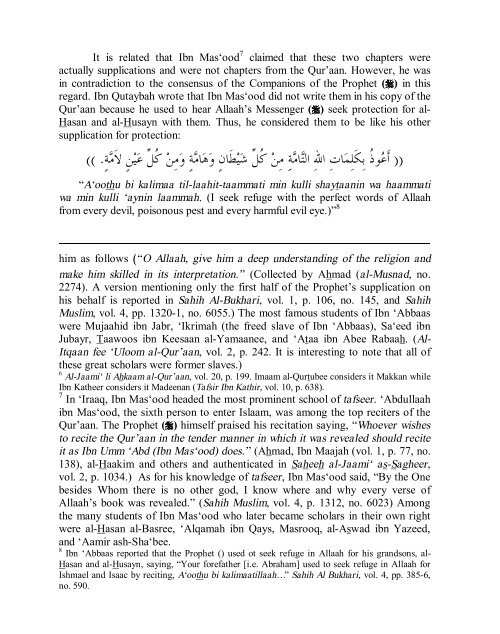Create successful ePaper yourself
Turn your PDF publications into a flip-book with our unique Google optimized e-Paper software.
It is related that Ibn Mas‘ood 7 claimed that these two chapters were<br />
actually supplications and were not chapters from the Qur’aan. However, he was<br />
in contradiction to the consensus of the Companions of the Prophet (r) in this<br />
regard. Ibn Qutaybah wrote that Ibn Mas‘ood did not write them in his copy of the<br />
Qur’aan because he used to hear Allaah’s Messenger (r) seek protection for al-<br />
Hasan and al-Husayn with them. Thus, he considered them to be like his other<br />
supplication for protection:<br />
أ َعوذ ُ بِك َلِماتِ االلهِ التامةِ مِن ك ُل ِّ شيط َانٍ وهامةٍ ومِن ك ُل ِّ عينٍ لا َ مةٍ. ))<br />
“A‘oothu bi kalimaa til-laahit-taammati min kulli shaytaanin wa haammati<br />
wa min kulli ‘aynin laammah. (I seek refuge with the perfect words of Allaah<br />
from every devil, poisonous pest and every harmful evil eye.)” 8<br />
))<br />
him as follows (“O Allaah, give him a deep understanding of the religion and<br />
make him skilled in its interpretation.” (Collected <strong>by</strong> Ahmad (al-Musnad, no.<br />
2274). A version mentioning only the first half of the Prophet’s supplication on<br />
his behalf is reported in Sahih Al-Bukhari, vol. 1, p. 106, no. 145, and Sahih<br />
Muslim, vol. 4, pp. 1320-1, no. 6055.) The most famous students of Ibn ‘Abbaas<br />
were Mujaahid ibn Jabr, ‘Ikrimah (the freed slave of Ibn ‘Abbaas), Sa‘eed ibn<br />
Jubayr, Taawoos ibn Keesaan al-Yamaanee, and ‘Ataa ibn Abee Rabaah. (Al-<br />
Itqaan fee ‘Uloom al-Qur’aan, vol. 2, p. 242. It is interesting to note that all of<br />
these great scholars were former slaves.)<br />
6 Al-Jaami‘ li Ahkaam al-Qur’aan, vol. 20, p. 199. Imaam al-Qurtubee considers it Makkan while<br />
Ibn Katheer considers it Madeenan (Tafsir Ibn Kathir, vol. 10, p. 638).<br />
7 In ‘Iraaq, Ibn Mas‘ood headed the most prominent school of tafseer. ‘Abdullaah<br />
ibn Mas‘ood, the sixth person to enter Islaam, was among the top reciters of the<br />
Qur’aan. The Prophet (r) himself praised his recitation saying, “Whoever wishes<br />
to recite the Qur’aan in the tender manner in which it was revealed should recite<br />
it as Ibn Umm ‘Abd (Ibn Mas‘ood) does.” (Ahmad, Ibn Maajah (vol. 1, p. 77, no.<br />
138), al-Haakim and others and authenticated in Saheeh al-Jaami‘ as-Sagheer,<br />
vol. 2, p. 1034.) As for his knowledge of tafseer, Ibn Mas‘ood said, “By the One<br />
besides Whom there is no other god, I know where and why every verse of<br />
Allaah’s book was revealed.” (Sahih Muslim, vol. 4, p. 1312, no. 6023) Among<br />
the many students of Ibn Mas‘ood who later became scholars in their own right<br />
were al-Hasan al-Basree, ‘Alqamah ibn Qays, Masrooq, al-Aswad ibn Yazeed,<br />
and ‘Aamir ash-Sha‘bee.<br />
8 Ibn ‘Abbaas reported that the Prophet () used ot seek refuge in Allaah for his grandsons, al-<br />
Hasan and al-Husayn, saying, “Your forefather [i.e. Abraham] used to seek refuge in Allaah for<br />
Ishmael and Isaac <strong>by</strong> reciting, A‘oothu bi kalimaatillaah…” Sahih Al Bukhari, vol. 4, pp. 385-6,<br />
no. 590.














